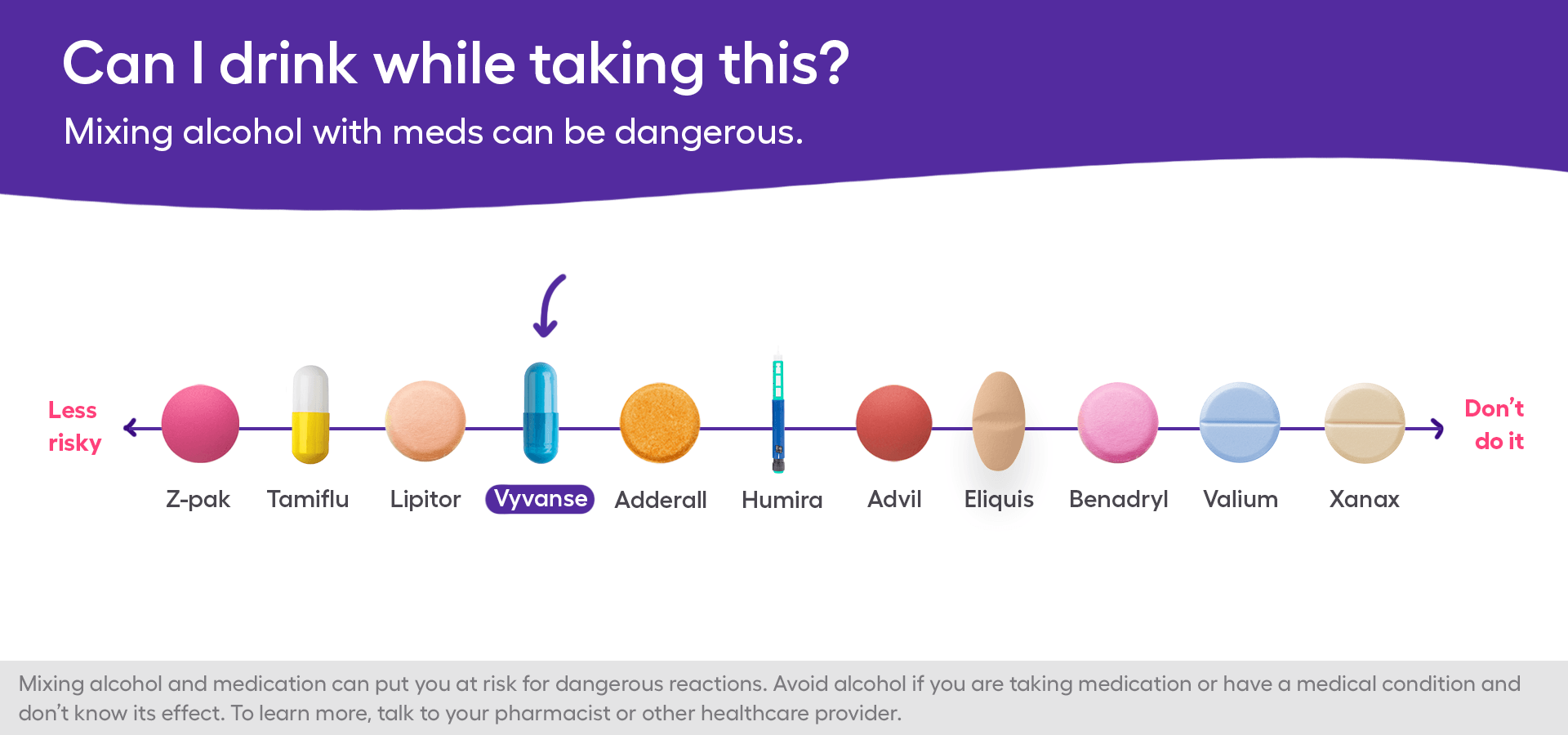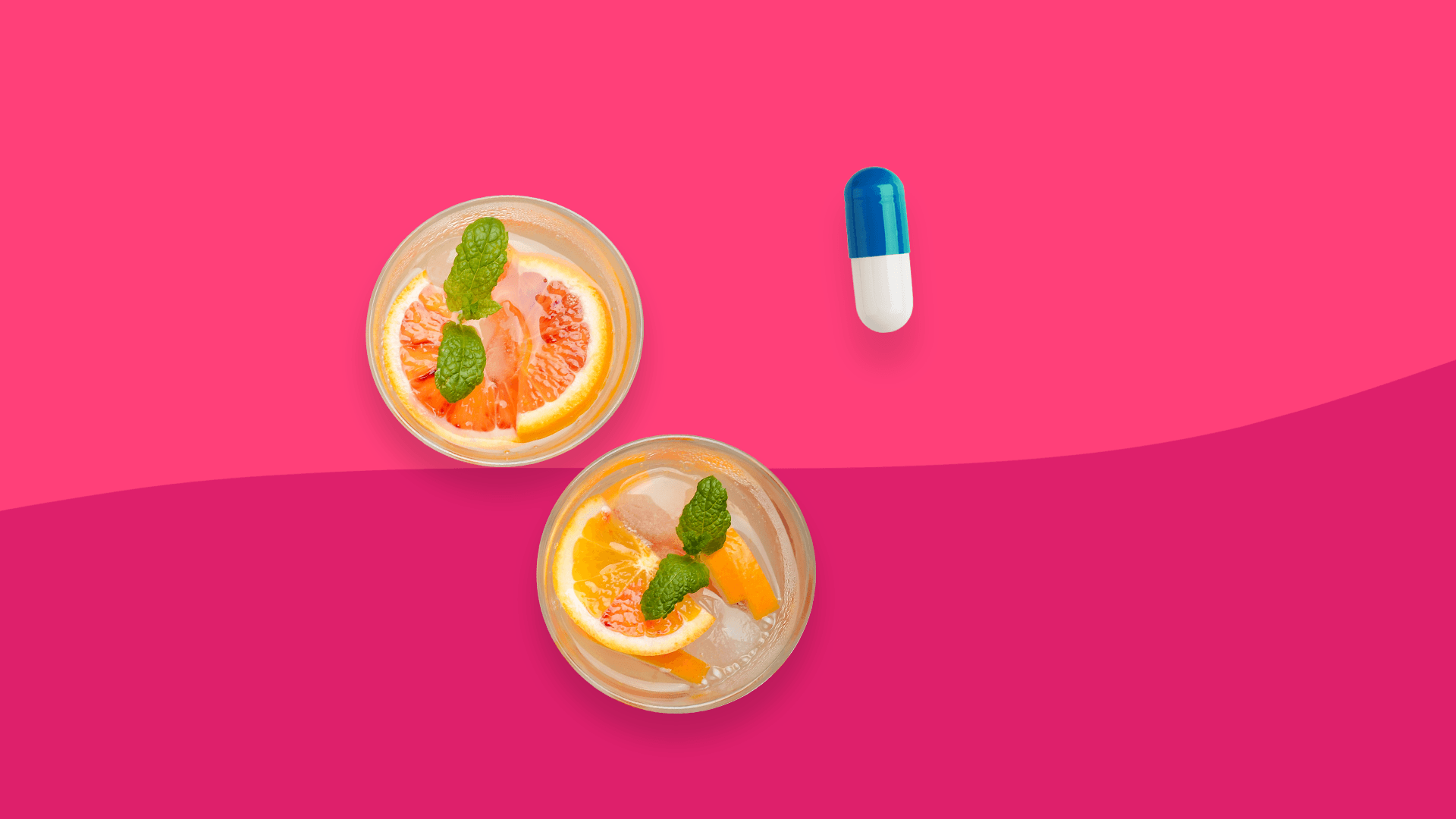Vyvanse (lisdexamfetamine dimesylate) is a popular prescription stimulant used to treat attention deficit hyperactivity disorder (ADHD) in adults and children 6 years and older, as well as binge eating disorder (BED) in adults. The most recent prescribing statistics show that almost 1.5 million Americans take Vyvanse.
Many patients want to know: Can I mix Vyvanse and alcohol? First, it’s important to know how this medication works and other safety information.
How does Vyvanse work?
Vyvanse is a prodrug. This means that the ingredient, lisdexamfetamine, is inactive until it is metabolized in the body into its active form, dextroamphetamine. The exact way it works for ADHD and BED is not understood. It is a central nervous system (CNS) stimulant, a medication that increases levels of dopamine and norepinephrine in the brain. It’s thought that the increased levels of dopamine and norepinephrine help improve alertness, attention, energy, and activity.
Is Vyvanse a controlled substance?
Vyvanse is a Schedule II controlled substance. Schedule II drugs are considered dangerous and have a high potential for abuse and dependence. Vyvanse also has a black box warning, which is the strongest warning required by the FDA. Before prescribing Vyvanse, the healthcare provider will assess the patient for risk of substance abuse. The patient should tell the prescriber if they have ever abused or been dependent on alcohol, street drugs, or prescription drugs. During treatment, the healthcare provider will monitor the patient for signs of abuse and dependence.
In cases of long-term use, it’s important to not abruptly stop Vyvanse, as it can cause withdrawal symptoms. Talk to a healthcare provider or mental health professional for medical advice before discontinuing Vyvanse.

Can you mix Vyvanse and alcohol?
The prescribing information of Vyvanse does not list alcohol as an interaction. However, there are four reasons that you should not mix Vyvanse and alcohol.
1. Heart risks
Vyvanse (and any CNS stimulant) can cause sudden death, heart attack, stroke, high blood pressure, and chest pain. Long-term use of Vyvanse can cause cardiomyopathy, or heart muscle disease. Excess alcohol use can also cause high blood pressure and heart problems, including cardiomyopathy. Mixing Vyvanse and alcohol can potentiate these side effects on the heart.
2. Alcohol poisoning
While Vyvanse stimulates the nervous system, alcohol has the opposite effect. Alcohol is a depressant. Because the depressant effects of alcohol counteract the stimulant effects of Vyvanse, it can take longer to feel the effects of alcohol. So, people who combine alcohol and Vyvanse may take much longer to feel the effects of alcohol and end up drinking an excessive amount of alcohol. Excess drinking can lead to alcohol poisoning, which is a medical emergency. Symptoms include confusion, seizures, vomiting, and passing out. Alcohol poisoning can also affect breathing and heart rate and can lead to a coma and death.
3. Vyvanse overdose
Since alcohol is a depressant, and Vyvanse is a stimulant, drinking alcohol can counteract Vyvanse’s effects. This may make it feel like the Vyvanse is not working. Then a person may disregard the directions, and take more Vyvanse, which can increase the risk for overdose. An overdose may manifest as a variety of symptoms which may include:
- Tremor
- Restlessness
- Overactive reflexes
- Fast breathing
- Confusion
- Hallucination
- Panic
- Nausea, vomiting, diarrhea, and cramping
- Life-threatening very high fever
- A life-threatening syndrome due to muscle breakdown
- Irregular heart rate and blood pressure
- Shock
Convulsions and coma may even occur and can lead to death.
4. Risk for substance abuse
Certain people have a higher risk for substance abuse problems than others, including those with ADHD. Both ADHD and alcohol use disorder can lower inhibition. Lowered inhibition can lead to risky behaviors such as driving while intoxicated, violence or criminal behaviors, or unsafe sexual situations.
RELATED: Common Vyvanse side effects
What about other ADHD medication and alcohol?
Other stimulant medications such as Adderall (mixed amphetamine salts), Ritalin (methylphenidate), and Concerta (methylphenidate extended-release) should not be mixed with alcohol for the same reasons listed above.
Help is available
If you or a loved one need help with alcohol abuse or substance use, help is always available. The U.S. Department of Health & Human Services Substance Abuse and Mental Health Services Administration (SAMHSA) offers many resources for addiction treatment programs on its website, or you can call the national helpline at 1800-662-HELP (4357).











